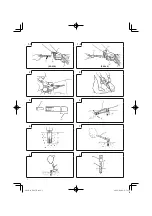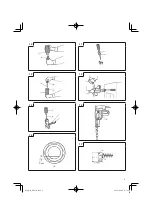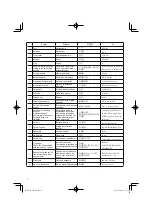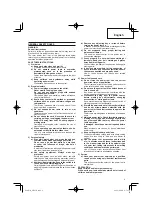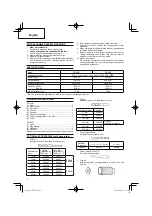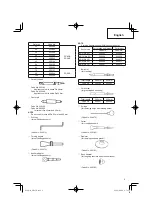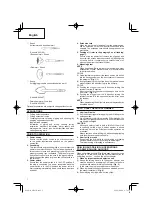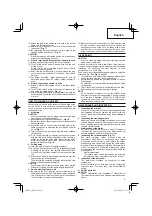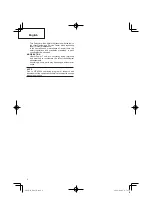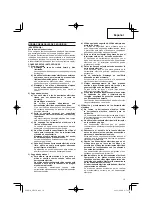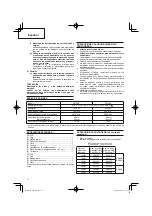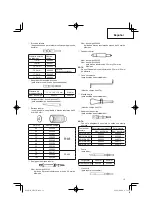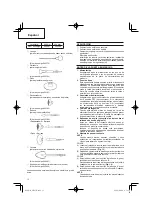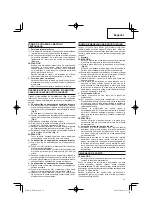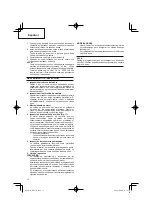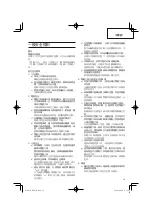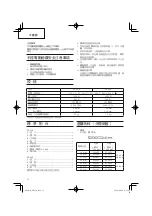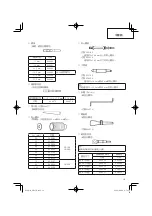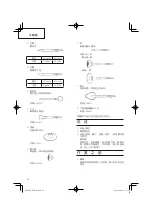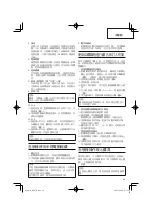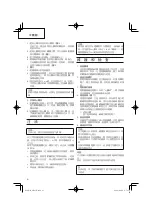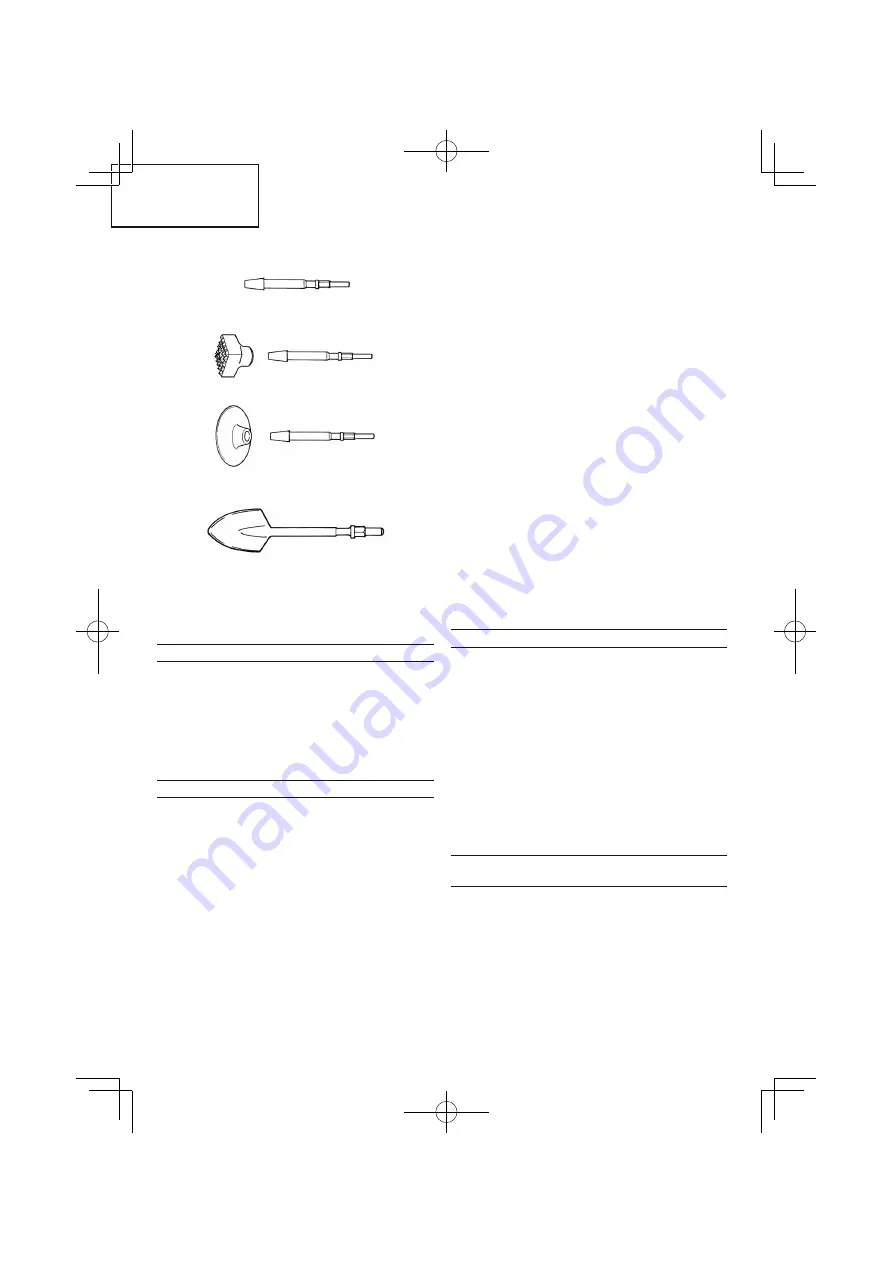
7
English
○
Shank
(for
rammer
and
bush
hammer)
(Code
No.
955186)
• Bush
hammer
+
Shank
•
Rammer
+
Shank
○
Scoop
(for
digging
ground
in
various
foundation
work)
(Code
No.
944967)
○
Rotary
hammer
oil
(one
liter)
(Code
No.
955009)
Optional
accessories
are
subject
to
change
without
notice.
APPLICATIONS
○
Drilling
holes
in
concrete
○
Drilling
anchor
bolt
holes
○
Crushing
concrete,
chipping,
digging,
and
squaring
(by
applying
optional
accessories)
(Application
Examples)
Installation
of
piping
and
wiring,
sanitary
facility
installation,
machinery
installation,
water
supply
and
drainage
work,
interior
jobs,
harbor
facilities
and
other
civil
engineering
work.
PRIOR TO OPERATION
1. Power source
Ensure
that
the
power
source
to
be
utilized
conforms
to
the
power
requirements
speci
fi
ed
on
the
product
nameplate.
2. Grounding
This
tool
should
be
grounded
while
in
use
to
protect
the
operator
from
electric
shock.
The
tool
is
equipped
with
a
three
conductor
cord
and
grounding
type
plug
to
fi
t
the
proper
grounding
type
receptacle.
The
green
(or
green
and
yellow)
conductor
in
the
cord
is
the
grounding
wire.
Never
connect
the
green
(or
green
and
yellow)
wire
to
a
live
terminal.
3. Power switch
Ensure
that
the
power
switch
is
in
the
OFF
position.
If
the
plug
is
connected
to
a
power
receptacle
while
the
power
switch
is
in
the
ON
position,
the
power
tool
will
start
operating
immediately,
which
could
cause
a
serious
accident.
4. Extension cord
When
the
work
area
is
removed
from
the
power
source,
use
an
extension
cord
of
su
ffi
cient
thickness
and
rated
capacity.
The
extension
cord
should
be
kept
as
short
as
practicable.
5. Feeding oil (refer to the paragraph on oil feeding,
page 7)
Prior
to
using
the
power
tool,
remove
the
oil
gauge
and
do
not
fail
the
oil
tank
with
the
provided
oil.
(Although
the
oil
tank
is
built
in,
it
contains
only
a
small
volume
of
oil
when
shipped
from
the
Hitachi
Works.)
6. Mounting a tool
NOTE
When
handling
drill
bits,
bull
point,
cold
chisel
and
other
accessories,
Hitachi
standard
tools
are
recommended
for
better
operation.
PR-25B
(1)
Raise
the
retainer
and
insert
the
shank
portion
of
a
drill
bit
into
the
hexagonal
hole
on
the
front
cover
until
it
reaches
the
extremity.
(
Fig. 1
-
1
)
(2)
By
slightly
tapping
the
top
of
the
bit
holder
with
a
wooden
mallet,
replace
the
bit
holder
to
grip
the
bit
fi
rmly.
PR-38E
(1)
Pushing
the
stopper
to
arrow
A
direction,
turning
the
retainer
to
arrow
B
direction.
After,
insert
the
tool
shank
into
the
hexagon
hole
on
the
front
cover.
(
Fig. 1
-
2
)
(2)
Pushing
the
stopper
to
arrow
A
direction,
turning
the
retainer
to
arrow
B
in
the
opposite
direction.
After,
apart
the
stopper.
NOTE
When
dismounting
the
bull
points,
reverse
the
procedures
described
above.
HOW TO USE THE ROTARY HAMMER
1. How to drill holes
(1)
Pull
the
switch
trigger
after
applying
the
drill
bit
tip
to
the
drilling
position.
(2)
It
is
unnecessary
to
forcibly
press
the
Drill
main
body.
It
is
su
ffi
cient
to
slightly
press
the
Drill
to
an
extent
that
clips
are
freely
discharged.
CAUTION
Although
a
safety
clutch
is
built
in
this
Drill,
the
drill
bit
is
suddenly
halted
when
it
strikes
against
a
buried
reinforcing
bar,
and
the
Drill
starts
reverse
operation
as
a
reaction.
Always
continue
a
hole-drilling
job,
while
strongly
gripping
both
the
side
handle
and
the
handle.
2. How to clip or crush
By
applying
the
drill
bit
tip
to
the
chipping
or
crushing
position,
operate
the
Drill
by
utilizing
its
own
weight.
Forcible
pressing
or
thrusting
is
unnecessary.
DRILLING AND DRIVING
-
IN OPERATIONS
FOR SELF
-
DRILLING ANCHORS
When
self-drilling
anchors
(
Fig. 4
)
are
used,
the
anchors
can
be
driven
in.
In
this
case,
use
the
optional
accessories
for
self-drilling
anchor…
such
as
the
anchor
adapter.
1. When an impact anchor adapter is used
(1)
Attach
the
turning
handle
to
the
anchor
adapter
and
create
a
base
hole
by
applying
Drill
impact
to
the
hole
position
while
manually
turning
the
handle.
(
Fig. 5
)
In
this
case,
the
plug
is
not
attached
to
the
anchor.
(2)
When
a
predetermined
depth
has
been
attained,
pull
out
the
anchor
tentatively.
(
Fig. 6
)
(3)
By
employing
a
syringe,
blow
out
the
chips.
000Book̲PR-25B.indb 7
000Book̲PR-25B.indb 7
2009/04/20 9:59:57
2009/04/20 9:59:57


